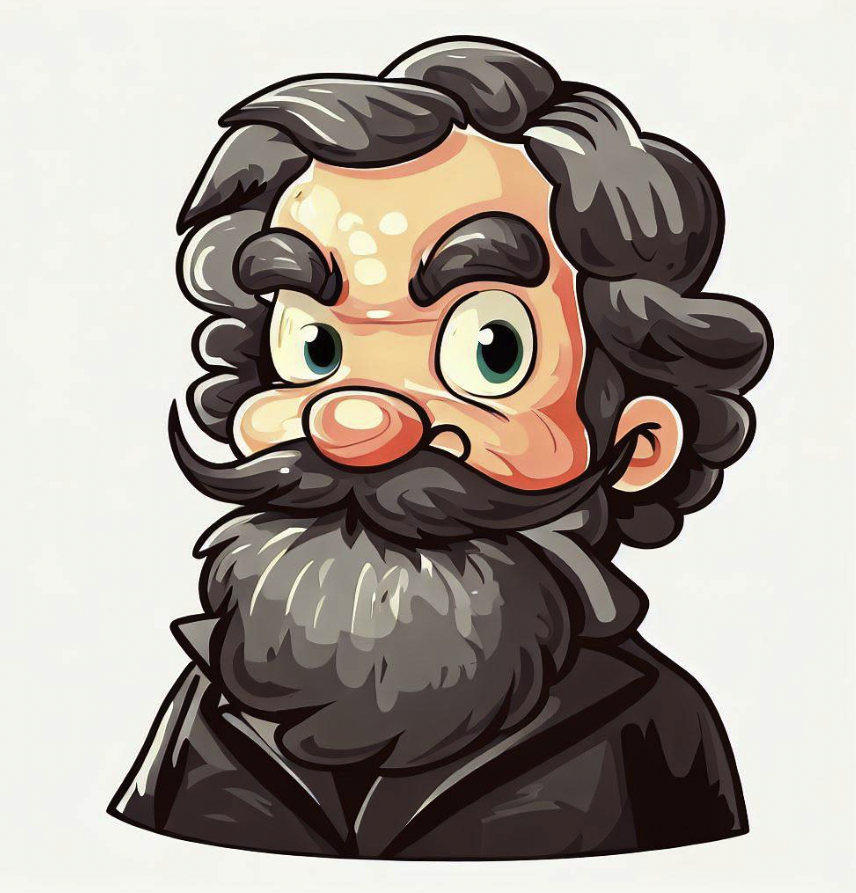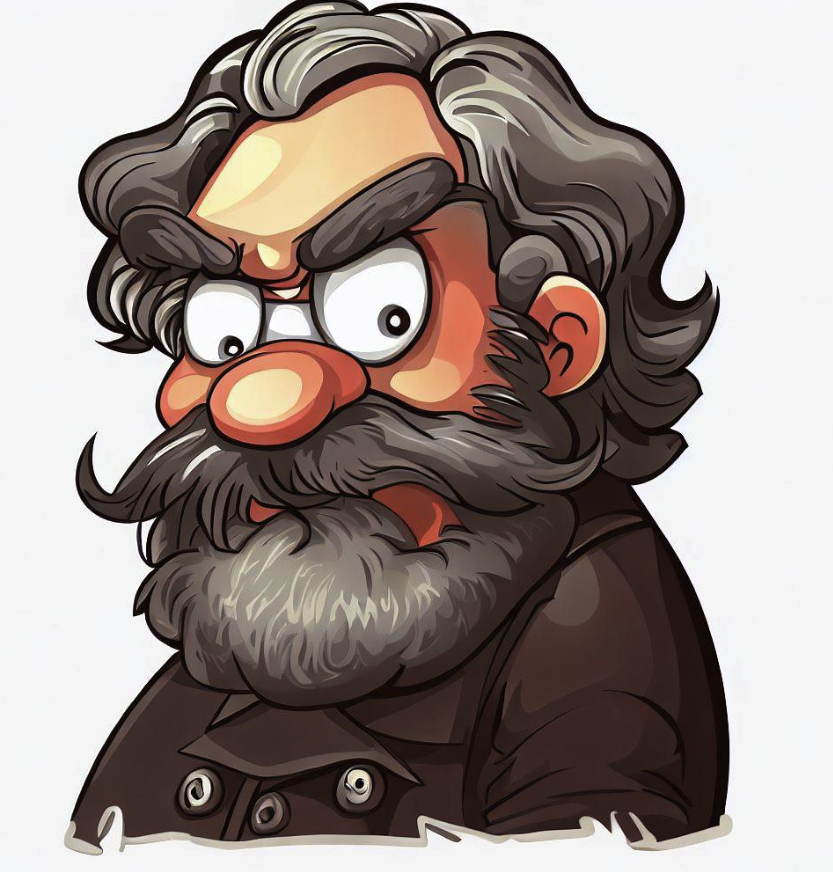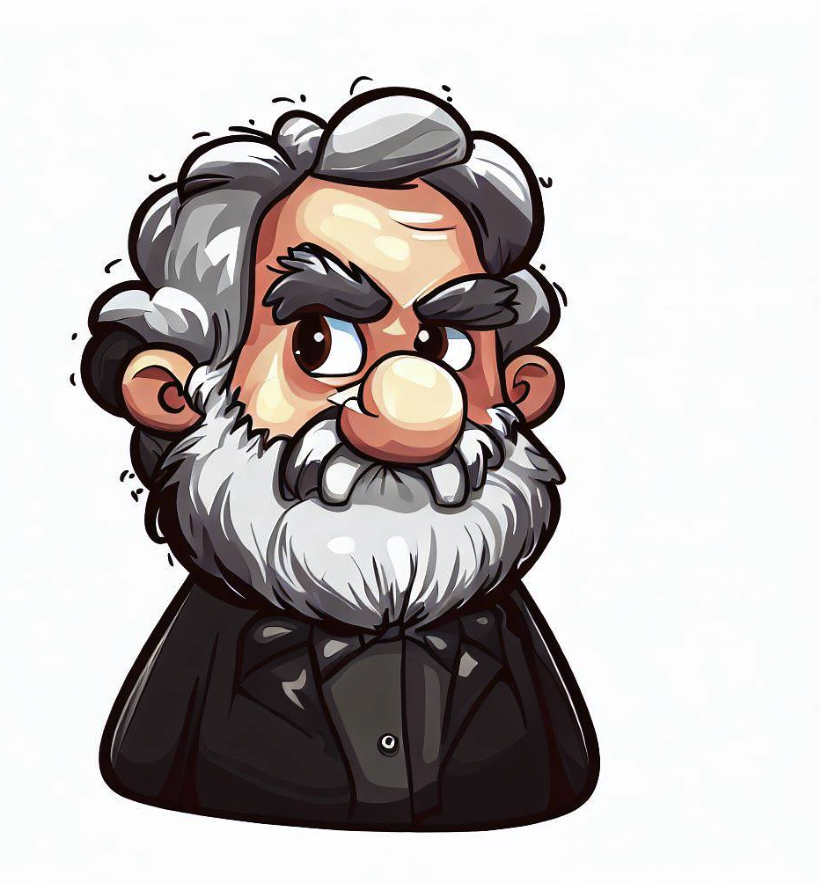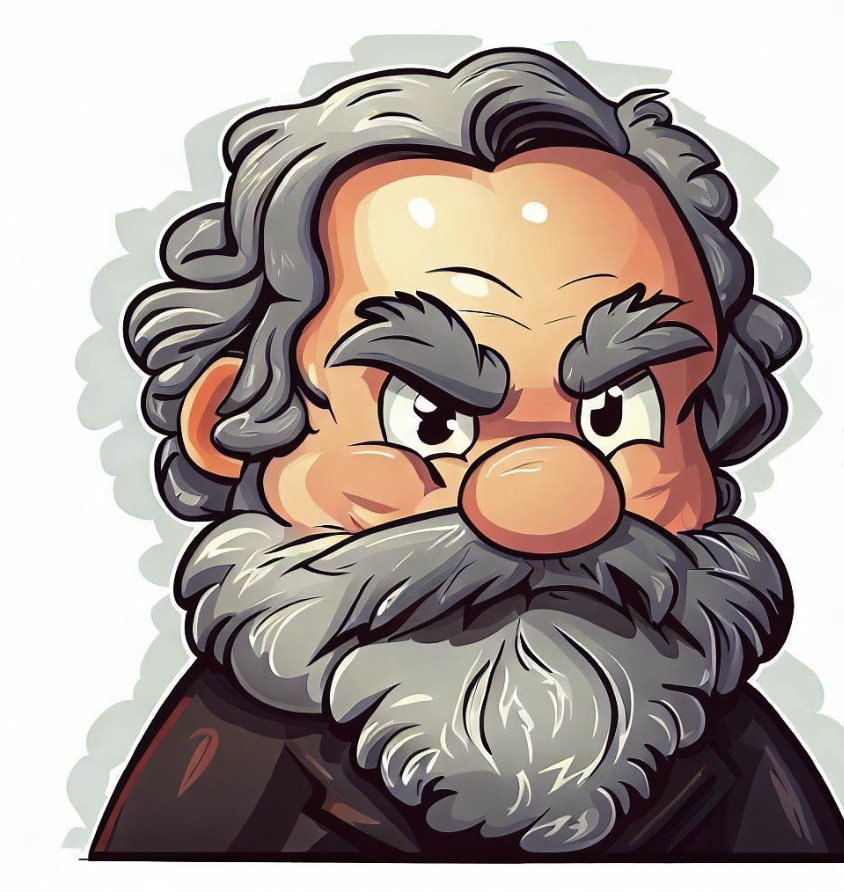Karl Marx was a philosopher, economist, and political theorist who is known for his influential writings on the nature of society, economics, and politics.
Here are some of the characteristics of Karl Marx’s quotes:
- Criticism of capitalism: Marx was a critic of capitalism, and many of his quotes reflect this perspective. He saw capitalism as a system that created inequality and exploitation, and he advocated for a socialist revolution to overthrow it.
- Emphasis on class struggle: Marx’s ideas were built on the concept of class struggle, which he saw as the driving force of history. Many of his quotes reflect this emphasis, with a focus on the struggle between the ruling class and the working class.
- Concern for workers: Marx was deeply concerned with the plight of workers under capitalism, and many of his quotes reflect this concern. He saw workers as being exploited and oppressed by capitalists, and he advocated for their rights and liberation.
- Focus on historical materialism: Marx’s ideas were grounded in historical materialism, which holds that economic and social conditions shape society and history. Many of his quotes reflect this focus on the material conditions of society and the importance of economic systems in shaping social relations.
- Call for revolution: Marx believed that revolution was necessary to overthrow capitalism and establish a socialist system. Many of his quotes reflect this call for revolution, with an emphasis on the need for collective action and solidarity among the working class.
Overall, Karl Marx’s quotes reflect his critique of capitalism, his concern for workers, and his call for revolution and the establishment of a socialist society.
Karl Marx Quotes
Here are 80 Karl Marx quotes:
- “The philosophers have only interpreted the world, in various ways. The point, however, is to change it.”
- “Religion is the sigh of the oppressed creature, the heart of a heartless world, and the soul of soulless conditions.”
- “The production of too many useful things results in too many useless people.”
- “The bourgeoisie, wherever it has got the upper hand, has put an end to all feudal, patriarchal, idyllic relations.”
- “Capital is dead labor, which, vampire-like, lives only by sucking living labor, and lives the more, the more labor it sucks.”
- “The oppressed are allowed once every few years to decide which particular representatives of the oppressing class are to represent and repress them.”
- “The history of all hitherto existing society is the history of class struggles.”
- “Men make their own history, but they do not make it as they please.”
- “The theory of the Communists may be summed up in the single sentence: abolition of private property.”
- “From each according to his ability, to each according to his needs.”
- “Workers of the world, unite!”
- “Let the ruling classes tremble at a communist revolution. The proletarians have nothing to lose but their chains. They have a world to win.”
- “The ruling ideas of each age have ever been the ideas of its ruling class.”
- “The first requisite for the happiness of the people is the abolition of religion.”
- “Democracy is the road to socialism.”
- “The education of all children, from the moment that they can get along without a mother’s care, shall be in state institutions.”
- “The philosophers have only interpreted the world in various ways; the point is to change it.”
- “Surround yourself with people who make you happy. People who make you laugh, who help you when you’re in need. People who genuinely care. They are the ones worth keeping in your life. Everyone else is just passing through.”
- “The history of all hitherto existing society is the history of class struggles.”
- “All that is solid melts into air.”
- “The oppressed are allowed once every few years to decide which particular representatives of the oppressing class are to represent and repress them.”
- “The proletarians have nothing to lose but their chains. They have a world to win. Workers of the world, unite!”
- “Revolutions are the locomotives of history.”
- “History repeats itself, first as tragedy, second as farce.”
- “Let us not forget that revolutions are accomplished through people, although they be nameless.”
- “The state is nothing but an instrument of oppression of one class by another – no less so in a democratic republic than in a monarchy.”
- “The production of too many useful things results in too many useless people.”
- “The theory of the Communists may be summed up in the single sentence: Abolition of private property.”
- “The bourgeoisie has stripped of its halo every occupation hitherto honored and looked up to with reverent awe. It has converted the physician, the lawyer, the priest, the poet, the man of science, into its paid wage laborers.”
- “Capital is money, capital is commodities. By virtue of it being value, it has acquired the occult ability to add value to itself. It brings forth living offspring, or, at the least, lays golden eggs.”
- “Let us not seek to satisfy our thirst for freedom by drinking from the cup of bitterness.”
- “The emancipation of women is impossible without the complete emancipation of all women, without the abolition of the class distinctions which make one a wage-slave and the other a mistress.”
- “The history of all hitherto existing society is the history of class struggles.”
- “The oppressed are allowed once every few years to decide which particular representatives of the oppressing class are to represent and repress them.”
- “The education of all children, from the moment that they can get along without a mother’s care, shall be in state institutions.”
- “Freedom consists in converting the state from an organ superimposed upon society into one completely subordinate to it.”
- “Reason has always existed, but not always in a reasonable form.”
- “To be radical is to grasp things by the root.”
- “The more the division of labor and the application of machinery extend, the more does competition extend among the workers, the more do their wages shrink together.”
- Let us wage a moral and political war against the billionaires and corporate leaders, on Wall Street and elsewhere, whose policies and greed are destroying the middle class of America.
- “The difference between the bourgeois and the proletarian is as between heaven and hell.”
- “The working class is revolutionary or it is nothing at all.”
- “The capitalist system has robbed the working class and deprived it of its rightful share.”
- “Society as a whole is more and more splitting up into two great hostile camps, into two great classes, directly facing each other: Bourgeoisie and Proletariat.”
- “The foundation of irreligious criticism is: Man makes religion, religion does not make man.”
- “The history of all previous societies has been the history of class struggles.”
- “The bourgeoisie cannot exist without constantly revolutionizing the instruments of production, and thereby the relations of production, and with them the whole relations of society.”
- “All science would be superfluous if the outward appearance and the essence of things directly coincided.”
- “The bourgeoisie has disclosed how it came to pass that the brutal display of vigour in the Middle Ages, which reactionaries so much admire, found its fitting complement in the most slothful indolence.”
- “The human being is in the most literal sense a political animal, not merely a gregarious animal, but an animal which can individuate itself only in the midst of society.”
- “The worker becomes all the poorer the more wealth he produces, the more his production increases in power and extent.”
- “The history of all previous societies has been the history of class struggles.”
- “Capital is dead labor, which, vampire-like, lives only by sucking living labor, and lives the more, the more labor it sucks.”
- “The less you eat, drink and buy books; the less you go to the theatre, the dance hall, the public house; the less you think, love, theorize, sing, paint, fence, etc., the more you save and the greater becomes your treasure which neither moths nor rust will devour.”
- “Reason has always existed, but not always in a reasonable form.”
- “The class struggle necessarily leads to the dictatorship of the proletariat.”
- “The only antidote to mental suffering is physical pain.”
- “The worker becomes all the poorer the more wealth he produces, the more his production increases in power and extent.”
- “Machines were, it may be said, the weapon employed by the capitalists to quell the revolt of specialized labor.”
- “Religion is the opium of the people.”
- “The theory of the Communists may be summed up in the single sentence: abolition of private property.”
- “Experience praises the most happy the one who made the most people happy.”
- “The ideas of the ruling class are in every epoch the ruling ideas, i.e., the class which is the ruling material force of society, is at the same time its ruling intellectual force.”
- “The history of all previous societies has been the history of class struggles.”
- “The bourgeoisie, by the rapid improvement of all instruments of production, by the immensely facilitated means of communication, draws all, even the most barbarian, nations into civilization.”
- “The bourgeoisie cannot exist without constantly revolutionizing the instruments of production, and thereby the relations of production, and with them the whole relations of society.”
- “The development of civilization and industry in general has always shown itself so active in the destruction of forests that everything that has been done for their conservation and production is completely insignificant in comparison.”
- “The proletarians have nothing to lose but their chains. They have a world to win. Workers of the world, unite!”
- “In every revolution, it is necessary to have revolutionary force.”
- “The theory of Communism may be summed up in one sentence: Abolish all private property.”
- “Political power, properly so called, is merely the organized power of one class for oppressing another.”
- “The ruling ideas are nothing more than the ideal expression of the dominant material relationships.”
- “Let the ruling classes tremble at a communist revolution. The proletarians have nothing to lose but their chains. They have a world to win.”
- “The mode of production in material life determines the general character of the social, political, and spiritual processes of life.”
- “The mode of production of material life conditions the general process of social, political, and intellectual life.”
- “The individual is the social being.”
- “The education of all children, from the moment that they can get along without a mother’s care, shall be in state institutions.”
- “The class struggle necessarily leads to the dictatorship of the proletariat.”
These quotes represent just a small selection of Karl Marx’s thoughts and ideas, and they illustrate his critique of capitalism, his call for revolution, and his emphasis on the importance of social and economic conditions in shaping society.

Karl Marx Quotes on Religion
Karl Marx Quotes on Religion:
- “Religion is the opium of the people.”
- “The first requisite for the happiness of the people is the abolition of religion.”
- “Religion is the sigh of the oppressed creature, the heart of a heartless world, and the soul of soulless conditions. It is the opium of the people.”
- “The abolition of religion as the illusory happiness of the people is the demand for their real happiness.”
- “The criticism of religion is the prerequisite of all criticism.”
- “The foundation of irreligious criticism is: Man makes religion, religion does not make man.”
- “The more of himself man attributes to God, the less he has left in himself.”
- “Religion is the impotence of the human mind to deal with occurrences it cannot understand.”
- “The more successful the capitalistic, the more advance is exploitation, and therefore, the more pronounced is the contrast between misery of the masses and the oligarchy of the millionaires.”
- “The social principles of Christianity preach cowardice, self-contempt, abasement, submission, and humbleness. The social principles of Christianity are hypocritical.”

Karl Marx Quotes in the Communist Manifesto
Karl Marx Quotes in the Communist Manifesto:
- “The history of all hitherto existing society is the history of class struggles.”
- “The bourgeoisie, wherever it has got the upper hand, has put an end to all feudal, patriarchal, idyllic relations.”
- “The bourgeoisie has stripped of its halo every occupation hitherto honored and looked up to with reverent awe.”
- “The bourgeoisie cannot exist without constantly revolutionizing the instruments of production.”
- “The bourgeoisie has torn away from the family its sentimental veil, and has reduced the family relation into a mere money relation.”
- “The bourgeoisie has resolved personal worth into exchange value.”
- “The bourgeoisie has created enormous cities, has greatly increased the urban population as compared with the rural, and has thus rescued a considerable part of the population from the idiocy of rural life.”
- “The bourgeoisie has subjected the country to the rule of the towns.”
- “The bourgeoisie has played a most revolutionary part in history.”
- “The bourgeois sees his wife a mere instrument of production.”

Revolutionary Quotes by Karl Marx
Revolutionary Quotes by Karl Marx:
- “The philosophers have only interpreted the world, in various ways; the point, however, is to change it.”
- “The theory of Communism may be summed up in one sentence: Abolish all private property.”
- “The working class is the only class that has the potential power to bring about a revolutionary change in society.”
- “Workers of the world unite; you have nothing to lose but your chains.”
- “The history of all hitherto existing society is the history of class struggles.”
- “Capital is dead labor, which, vampire-like, lives only by sucking living labor, and lives the more, the more labor it sucks.”
- “The struggle against capital is not a struggle for disintegrating the constitutional foundations of society. It is a struggle for their transformation, for the abolition of property in land and in the means of production.”
- “All that is solid melts into air, all that is holy is profaned, and man is at last compelled to face with sober senses his real conditions of life, and his relations with his kind.”
- “In communist society, where nobody has one exclusive sphere of activity but each can become accomplished in any branch he wishes, society regulates the general production and thus makes it possible for me to do one thing today and another tomorrow, to hunt in the morning, fish in the afternoon, cattle breeding in the evening, criticize after dinner, just as I have a mind, without ever becoming hunter, fisherman, herdsman or critic.”
- “The proletarians have nothing to lose but their chains. They have a world to win. Proletarians of all countries, unite!”
Summary of The Communist Manifesto
The Communist Manifesto, written by Karl Marx and Friedrich Engels and published in 1848, is a political pamphlet that lays out the principles of communism and calls for the working class, or proletariat, to rise up against the ruling class, or bourgeoisie.
The Manifesto is divided into four main sections: the introduction, bourgeoisie and proletarians, socialist and communist literature, and the position of the communists in relation to the various existing opposition parties.
Introduction
The introduction emphasizes the growing influence of communism and the need for a unified platform to address the “specter of communism” haunting Europe.
Marx and Engels assert that the history of society is a history of class struggles, and that the era of bourgeoisie dominance is nearing its end.
Bourgeoisie and Proletarians
This section details the rise of the bourgeoisie, their impact on society, and the subsequent emergence of the proletariat.
The bourgeoisie’s success lies in its ability to adapt to changing economic conditions and to exploit new markets.
This leads to the creation of the proletariat, a class of wage laborers dependent on the bourgeoisie for their livelihood.
However, Marx and Engels argue that the bourgeoisie’s own success sows the seeds of its downfall.
The proletariat grows in size and strength, becoming more aware of its power and potential.
The Manifesto claims that the eventual overthrow of the bourgeoisie and the establishment of a classless society is an inevitable result of historical development.
Socialist and Communist Literature
In this section, Marx and Engels review various contemporary socialist and communist movements, critiquing their theories and distinguishing their own brand of communism.
They classify these movements into three categories:
- reactionary socialism
- conservative or bourgeois socialism, and
- critical-utopian socialism and communism
Marx and Engels argue that their version of communism is the only one that truly represents the interests of the working class and can lead to the abolition of class distinctions.
Position of the Communists in Relation to Various Existing Opposition Parties
The final section outlines the political stance of communists in relation to other opposition parties.
Marx and Engels call for international cooperation among working-class movements and emphasize the need for communists to support any revolutionary movements that challenge the existing social order.
The Communist Manifesto ends with the rallying cry, “Workers of the world, unite!” which underscores the importance of solidarity among the working class in their struggle for a more equitable society.
Conclusion – Karl Marx Quotes
Karl Marx was a philosopher, economist, and political theorist whose ideas have had a profound impact on the world.
His quotes are characterized by a strong critique of capitalism, a call for revolution, and a focus on the importance of social and economic conditions in shaping society.
Marx believed that history was shaped by class struggle, and he saw the working class as the key agent for social change.
While his ideas have been subject to much debate and controversy, his legacy continues to inspire social movements and critiques of capitalism to this day.


